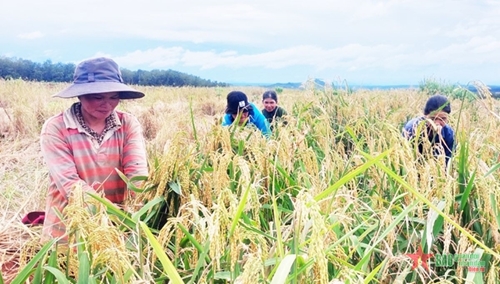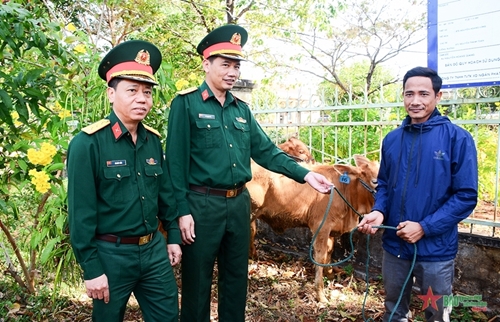One of the business’s most significant deeds is providing land for local residents and ethnic communities to grow crops and rice. Ro Cham Diu in Bua village, Ia Pnon commune, Duc Co district is one of the locals that has benefited from the policy. Holding a bundle of rice in her hands, Mrs. Diu could not conceal her gratefulness for Company 72. According to her, the unit has lent her more than 1.5 hectares of land to replant rubber trees to grow rice. “This crop, I harvested more than 4 tons of rice," she said.
    |
 |
|
The local people harvest rice. |
Like Diu, the family of Ro Lan Nguyen in Bua village has been busy transporting rice home recently. This year, Company 72 has lent his family 2 hectares to grow rice. In 2021, he also cultivated on 3 hectares of land borrowed from the unit. Thanks to that, his family’s living standards have been significantly improved. More importantly, he can now afford to help other needy people in the village.
Diu and Nguyen’s families are two out of hundreds of needy households in border communes of Gia Lai province that have benefited from Company 72’s land policy. Thanks to that, locals’ living standards have been significantly enhanced.
In 2021, the company lent 324 hectares of land to 300 households to conduct agricultural production. The numbers have increased to 550 households and 395 hectares in 2022 and 754 households and 500 hectares in 2023. In addition, the unit has supported needy ethnic minority families to reclaim land, equipped them with farming techniques, and presented breeding cows to poor and near-poor households.
According to Director of Company 72 Colonel Ha Trong Bao, the unit has sent production teams to three border communes of Ia Pnon, Ia Nan, Ia Dom and a part of Ia Kla commune, Chu Ty townlet, Duc Co district. Its branches in Cambodia have formed teams in seven communes of Oyadav and Bo Keo districts, Ratanakiri province.
    |
 |
|
Leaders of Company 72 hand over breeding cows to poor households. |
Realizing the motto, “Corps connects province and districts; company connects districts and communes; production teams connect villages; the Kinh (the ethnic majority group) families connect ethnic minority ones,” the company has attached great importance to assisting localities in socio-economic development, thus eliminating hunger and reducing poverty and consolidating defense and security posture in border areas. The unit has invested in building facilities to serve daily needs and production activities of ethnic minority groups in a bid to actualize project 4 of phase 1 of the national target program for socio-economic development in ethnic minority and mountainous areas in the 2021-2030 period.
The company has effectively carried out the model, titled one production team is a cluster of residential areas. Until now, 18 residential areas have been formed with more than 2,000 households living in different villages, creating a 30-km belt to meet the requirements of production and defense and security consolidation.
Together with that, the unit has invested in building and repairing more than 96km of roads, connecting villages and residential areas; constructing 122 bridges and irrigation systems; allocating VND 100 billion to install electricity systems in residential areas to serve production and daily activities; providing VND 50 billion to build schools, kindergartens, hostels, infirmaries, and water filter systems for workers; and spending VND 20 billion on building houses for needy people.
So far, 14 production teams of the company have twinned with 14 ethnic minority communities. Thanks to the unit’s efforts, 1,216 Kinh families have connected with 1,216 ethnic minority ones and assisted them in developing domestic economy and removing backward customs. Through the “Connection Jar of Rice” model, Company 72 has mobilized 100 tons of rice to support needy households in border areas.
Party Secretary of Duc Co district Pham Van Cuong highlighted Company 72’s activeness in conducting mass mobilization movements. By lending locals its land and supporting localities in building facilities, the unit has effectively contributed to border localities’ new-style rural area building. “The local party committees and authorities treasure this valuable support,” said Cuong.
Translated by Tran Hoai